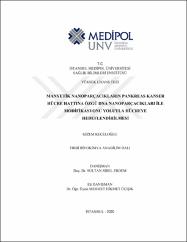| dc.contributor.advisor | Erdem, Sultan Sibel | |
| dc.contributor.advisor | Üçışık, Mehmet Hikmet | |
| dc.contributor.author | Keçeloğlu, Gizem | |
| dc.date.accessioned | 2021-08-20T10:19:12Z | |
| dc.date.available | 2021-08-20T10:19:12Z | |
| dc.date.issued | 2020 | en_US |
| dc.date.submitted | 2020 | |
| dc.identifier.citation | Keçeloğlu, G. (2020). Manyetik nanoparçacıkların pankreas kanser hücre hattına özgü DNA nanoparçacıkları ile modifikasyonu yoluyla hücreye hedeflendirilmesi. (Yayınlanmamış yüksek lisans tezi). İstanbul Medipol Üniversitesi Sağlık Bilimleri Enstitüsü, İstanbul. | en_US |
| dc.identifier.uri | https://hdl.handle.net/20.500.12511/7907 | |
| dc.description.abstract | Kanser türüne özel geliştirilmeye çalışılan kişiselleştirilmiş tıp uygulamaları, aptamer, ligand ve antikor gibi ajanların afiniteye bağlı olarak aktif hedeflemede kullanılmasını içerir. Bu yaklaşım, spesifik bir hücre biyobelirtecine yönelik molekül-molekül etkileşimini içermekte, tedavideki başarı da ilacı kanser hücrelerine yönlendirebilme yeterliliğine bağlı olarak sınırlı kalmaktadır. Alternatif bir hedefleme yöntemi olarak çalışmamız, birden fazla etkileşim ile hücre hedefleme yetisine sahip DNA nanoparçacığın manyetik nanoparçacık ile birleştirilerek kanserli hücrelere hedeflendirilmesini konu alır. Çalışmanın amacı, hipertermide kullanılmak üzere manyetik nanoparçacıkların DNA nanoparçacık sistemi ile konjuge edilerek Panc02 pankreas kanser hücre hattına hedeflendirilmesidir. Bu amaçla, öncelikle Panc02 mürin pankreas kanseri hücre hattına özgü DNA nanoparçacık yuvarlanan halka çoğaltması (RCA) yöntemiyle sentezlenmiştir. DNA nanoparçacığın sekansına komplementer bir bağlayıcı sekans, amit bağı oluşumuyla manyetik demir oksit nanoparçacıklarının yüzeyine bağlanmıştır. Bağlayıcı sekans manyetik nanoparçacığın, DNA nanoparçacık ile konjugasonunu mümkün kılmıştır. Yapılan karakterizasyon çalışmaları sonucunda DNA nanoparçacığın morfolojisinde (büyüklük ve yapısal) değişiklikler olmasına rağmen Panc02 hücre hattına seçici olarak bağlanma özelliğini koruduğu kontrollü hücre kültürü çalışmaları neticesinde belirlenmiştir. Elde edilen veriler, DNA nanoparçacığın antikor, aptamer ve ligandlara alternatif olarak manyetik nanoparçacık başta olmak üzere birçok farklı ilaç taşıma sistemini hücrelere hedeflemede kullanılabileceğini göstermiştir. Ayrıca kendi başına taşıma sistemi olarak kullanıldığında DNA nanoparçacığın çeşitli terapi ajanlarını istenilen hücreye taşıyarak klasik tedavi yöntemlerine seçicilik kazandırabileceği öngörülmektedir. | en_US |
| dc.description.abstract | One of the major obstacles to the success of cancer therapy is the fact that the therapeutic agents affect healthy cells almost equally as cancerous cells. Enabling the targeting of the cancerous tissue, personalized medicine applications are being developed for cancer types by the use of agents such as aptamers, ligand and antibodies where targeting base on single molecule-molecule interactions, or as named affinity. As a novel approach, our study focuses on cellular recognition and targeting by means of DNA nanoparticle, or so-named DeNAno, composed of repeatitive nucleotide sequences. Accordingly, DeNano's achieve cell recognition through avidity rather than affinity, in other words through establishment of multiple interactions with the cell membrane. The aim of the studies to use the DNA nanoparticular system for targeting the magnetic nanoparticles to Panc02 murine pancreatic cancer cell line further to allow hyperthermia application selectively on cancer cells. For this purpose, DeNAno was synthesized by nanoparticle Rolling Circle Amplification (RCA) method from a nucleotide sequence that is specific to Panc02. To achieve conjugation of the magnetic nanoparticle with DeNAno, linker sequences that are complementary to the nucleotide sequence of DeNAno are attached to the surface of magnetic iron oxide nanoparticles by amide bonds. Characterization analysis confirmed the conjugation of DeNano with magnetic nanoparticles through the complementray sequence. Cell culture studies proved that selectivity of DeNAno for Panc02 cells was preserved also after conjugation. The results suggest not only that DeNAno's to successfully target magnetic nanoparticles to Panc02 cells, but also highlight their potential to contribute the classical chemotherapy approaches as a targeted drug delivery system. | en_US |
| dc.language.iso | tur | en_US |
| dc.publisher | İstanbul Medipol Üniversitesi Sağlık Bilimleri Enstitüsü | en_US |
| dc.rights | info:eu-repo/semantics/openAccess | en_US |
| dc.subject | DNA Nanoparçacık | en_US |
| dc.subject | Manyetik Nanoparçacık | en_US |
| dc.subject | DeNAno | en_US |
| dc.subject | Hedefli İlaç Taşıma Sistemleri | en_US |
| dc.subject | Yuvarlanan Halka Çoğaltması | en_US |
| dc.subject | DNA Nanoparticle | en_US |
| dc.subject | Magnetic Nanoparticle | en_US |
| dc.subject | DeNAno | en_US |
| dc.subject | Targeted Drug Delivery Systems | en_US |
| dc.subject | Rolling Circle Amplification | en_US |
| dc.title | Manyetik nanoparçacıkların pankreas kanser hücre hattına özgü DNA nanoparçacıkları ile modifikasyonu yoluyla hücreye hedeflendirilmesi | en_US |
| dc.title.alternative | Targeting of magnetic nanoparticles to the cell by modification of pancreatic cancer cell line spesific DNA nanoparticles | en_US |
| dc.type | masterThesis | en_US |
| dc.department | İstanbul Medipol Üniversitesi, Sağlık Bilimleri Enstitüsü, Biyokimya Ana Bilim Dalı | en_US |
| dc.relation.publicationcategory | Tez | en_US |


















